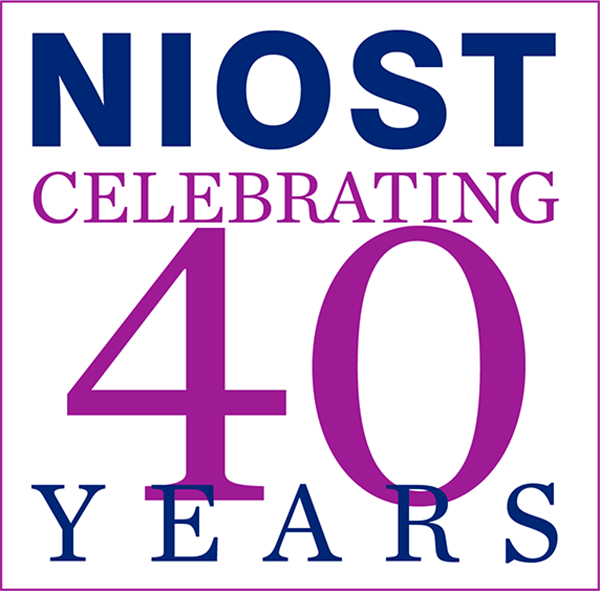Georgia Hall's Projects
Out-of-School Time Quality to Youth Outcomes
Ongoing since 2017
Principal Investigator: Georgia Hall, Ph.D.
Project Director: Katie Wheeler, Ed.D.
Funder: The Charles Stewart Mott Foundation
This study examines whether extended participation in high-quality OST programs is positively associated with the development of literacy skills and social emotional learning skills. Funded by the Charles Stewart Mott Foundation, this research is taking place in Minnesota and Massachusetts. It is a partnership among four organizations: the American Institutes for Research (AIR); the National Institute on Out-of-School Time (NIOST); the Minnesota Department of Education; and the Massachusetts Department of Elementary and Secondary Education. Our goal is to follow youth who participate in these programs over the span of two consecutive years while enrolled in Grades 1 and 2 in Massachusetts and in Grades 4 and 5 in Minnesota. Findings will inform a better understanding of how extended participation in high-quality 21st CCLC programs is associated with growth and development of social-emotional learning skills and other essential skills and competencies measured over time, and development of key literacy skills.
 Georgia S. Hall, Ph.D., Senior Research Scientist, National Institute on Out-of-School Time, Wellesley College is profiled in Robert Wood Johnson Foundation Active Living Research.
Georgia S. Hall, Ph.D., Senior Research Scientist, National Institute on Out-of-School Time, Wellesley College is profiled in Robert Wood Johnson Foundation Active Living Research.
Boston Summer Learning Project
Ongoing since 2010
Principal Investigators: Georgia Hall, Ph.D.
Funders: Boston and Beyond and Boston Opportunity Agenda
This project will evaluate the Boston Summer Learning Program
This ongoing evaluation initiative examines the impacts of participation in the Boston Summer Learning Program on school-community partnership development, youth summer learning loss, and blended learning practices. The evaluation uses a mixed methods approach and analyzes data from youth summer program staff, observations, and district level indicators.
Building APAS and Literacy Capacity in Philadelphia Out-of-School Time Programs
2019-2023
Project Directors: Georgia Hall, Ph.D., and Kathy Schleyer, M.S., National Institute on Out-of-School Time
Funded by: William Penn Foundation
The National Institute on Out-of-School Time (NIOST) is partnering with afterschool programs in Philadelphia, PA to improve the quality of programming, specifically to enable literacy-rich environments for kindergarten through 3rd-grade participants. These improvements are made by growing staff capacity around activity design, planning, and delivery using program quality assessment practices, coaching, and continuous program improvement approaches.
After an initial partnership with five afterschool programs during the first three years of the grant, the project is expanding to a new cohort of 10 programs that will receive literacy and quality supports. Each program identifies the literacy outcomes they aim to attain, and the NIOST team works with the programs to guide their efforts through training, individual site coaching, and providing resources. While strengthening literacy, NIOST also promotes social and emotional wellbeing.
Among other forms of support, NIOST conducts virtual community of practice meetings with participating programs to help them learn, plan, and support each other. It designs virtual literacy training to give providers tools and strategies for immediate implementation. It has also surveyed program staff about literacy skill development and hosted and curated an online platform for ongoing access to resources and recorded training sessions.
In a survey, program leaders said that access to virtual coaching supports, obtaining useful resources, and connecting with other providers were the most beneficial aspects of their participation in the project.
 State primary elections are wrapping up and election season isn't far behind. Regardless of political beliefs, out-of-school-time programs are helping the next generation of voters become informed and engaged citizens, as research from Afterschool Matters has shown.
State primary elections are wrapping up and election season isn't far behind. Regardless of political beliefs, out-of-school-time programs are helping the next generation of voters become informed and engaged citizens, as research from Afterschool Matters has shown.
CityWorks: Building Strong Citywide Afterschool Initiatives
Completed in 2004
Project Directors: Georgia Hall, Ph.D., Brooke Harvey, B.A.
Funders: Charles Stewart Mott Foundation, National Institute on Out-of-School Time
CityWorks was an initiative of the National Institute on Out-of-School Time (NIOST) working in collaboration with existing communities that provide high quality out-of-school time programming to youth and children. CityWorks aimed to build on the successful foundation of the "Cross-Cities Network for Leaders of Citywide After-School Initiatives" (CCN), which brings together leaders of after-school initiatives from 21 major cities across the United States.
Through CityWorks, NIOST investigated the development of infrastructures that supported sustainable quality program outcomes, and through dissemination of Promising Practices improved the availability and preservation of out-of-school time programming. Cityworks also collaborated with the National League of Cities Institute for Youth, Education and Families to provide technical assistance to more cities and to provide Network members with technical assistance on working with city officials to further their initiatives.
Activities
In bringing the experiences of stakeholders, service providers, schools, and community organizations together, NIOST learned and shared strategies for strengthening the infrastructure for out-of-school time activity including improving methods for recruiting and training providers, program development, establishing accountability/evaluation systems, and developing and sustaining financial support. By sharing best practices of the CCN, CityWorks sought to strengthen and enhance citywide after-school initiatives and the communities they serve.
The five major activities that CityWorks undertook were:
- Identify Promising Practices related to systems-building and infrastructure development,
- Collaborate with Institute for Youth, Education and Families (IYEF) of the National League of Cities,
- Host a meeting the second year of the grant period for network members,
- Facilitate a continuous communication stream through an active e-mail discussion group,
- Provide published and web-based information to support the dissemination of Promising Practices including four topical briefs that spotlight new ideas and trends.
Products
There were four projected products from this collaborative: (1) a report describing the process of identifying, collecting, and evaluating and documenting Promising Practices related to systems-building and infrastructure development; (2) four issues of "After School Issues" researched, written, designed, and published by NIOST; (3) a "Meeting Notebook" which contains meeting logistics, supporting readings and documentation, and other technical assistance materials; and (4) technical assistance such as presentations, coaching, and facilitating a community vision or goal development process. The audience for these products will be members of CCN, policy makers, intermediary organizations, and practitioners.
Expected Outcomes
There are multiple benefits from this project. CityWorks will allow communities to have a full range of practices to learn from — relating to program, community and systems-building, and infrastructure development. Increases in the capacity of key leaders, including increased knowledge, access to information, and shared development of new approaches to implementing large after-school initiatives will result in increased effectiveness of the citywide initiatives. The influence of the leaders, the new strategies, and exploration of Promising Practices will lead to changes in the field, including new models, paradigms, and integrated visions.
Through the collaboration with IYEF, the expertise and experience gained will be extended to a broader network of municipal leaders who will gain a deeper understanding of the challenges facing large scale citywide after-school initiatives. Ultimately, CityWorks will create a more knowledgeable and effective national community of leaders, enabling communities to create and sustain responsive and effective out-of-school time systems that positively impact children and families.
The project was funded by the Charles Stewart Mott Foundation .
Continuous Program Quality Improvement, Summer Learning, and Training
Ongoing since 2005
Principal Investigator and Project Director: Georgia Hall, Ph.D.
Funderd by: Boston After School & Beyond
NIOST has served as a research and evaluation partner to Boston After School & Beyond since 2009. Collaboration with Boston After School & Beyond and Boston Public Schools and local community-based organizations has included the investigation of components of school CBO partnership afterschool programming and potential contributions to positive youth outcomes along with exploring how integrated approaches to summer learning, based on meeting the needs and interests of students, can advance student learning. NIOST with its partners has pursued multiple levels of investigation and utilized a menu of field-tested tools to gather extensive data to inform the continued development and sustainability of the Boston Summer Learning Project and school-year OST programs. Research methods have included program observation (using the APT), youth survey data collection, interviews, focus groups, and collection of school level data. Summer learning investigation included five programs in 2009 growing to 130 programs in 2017. NIOST, with its partners, is currently engaged in a training initiative focused on developing a cadre of trained program quality observers (partner program staff) using the APT to continue to build high quality program practices and experiences for children and older youth.
Cross-Cities Network
Completed in 2007
Senior Research Advisor: Georgia Hall, Ph.D.
This project connected high-level leaders from different cities and states to educate them on the dynamic landscape of after-school programs. in hopes of directing the influence, funding, and high expectations of these leaders towards a "critical mass" of associated initiatives across the country.
The Cross-Cities Network (CCN) brings together leaders from 25 citywide after-school initiatives in major cities across the United States. The three primary goals of this project are the following:
To increase the capacity and knowledge of high-level leaders.
- To improve the effectiveness of citywide after school initiatives.
- To contribute to the development of a coherent vision for the field at the national level.
The landscape of after school programs is growing and changing at a rapid pace. Many leaders have influence, funding, and high expectations of results, but little in the way of signposts to guide them in reaching their goals. This is an opportune time to capture the synergistic potential of a group of creative, passionate leader-implementers, meeting their needs for knowledge, access to information, and engagement in high-level dialogue on major issues facing the field. The theory of change inherent in this project is that increasing the capacity of influential leaders will result in improved strategies employed in their own initiatives. We postulate that the presence of a "critical mass" of successful, associated initiatives will in turn influence policy development and programs at multiple levels across the country.
The content, scope, and priorities of the CCN will be driven by the Network members, within the context of a communication system designed to provide continuous feedback for developing and refining strategies and activities. The creation of an effective network requires background staffing and support, careful crafting of materials, processes, and agendas to meet the needs of citywide leaders, and cutting-edge thinking to frame issues and develop typologies that help define the landscape. The National Institute on Out-of-School Time will fill these roles.
Proposed Activities:
There are five major activities that form that foundation for the Network:
- one-to-two meetings per year of the core group of selected leaders from urban initiatives, which will include site visits, open dialogue, and focused discussion, with possible presentations by selected experts
- a continuous communication stream maintained through an email discussion group
- regular topical briefings on core issues of interest to network participants
- a centrally located database configured to provide up-to-date information on selected characteristics of initiatives, and products based on this data, including formatted profiles of each member initiative
- development of policy research reports and supporting materials that help to frame the issues and deepen understanding of the work of Network participants
Products:
The major external products from this project will be the topical briefings, initiative profiles, and policy research reports. The primary audience for these products will be members of the Cross-Cities Network. Secondary audiences will include: non-member citywide initiatives, intermediary organizations, practitioners, researchers, evaluators, and policy makers.
Expected outcomes:
There are anticipated outcomes for the project on three levels — leadership, local initiative, and field — which are linked through a theory of change. The first level, and the direct target level for the project, is the individual leader. The model hypothesizes that increases in the capacity of key leaders, including increased knowledge, access to information, and shared development of new approaches to implementing large after school initiatives will result in increased effectiveness of the citywide initiatives to which the leaders belong. The influence of the leaders, the new strategies developed by the group, and the impact of the initiatives themselves on the national landscape will lead to changes in the field, including new models, paradigms, and integrated visions.
The Cross-Cities Network will develop in a context of intense activity in the field. We expect that the Network will serve as a conduit for learning from and connecting with other projects, initiatives, and funding streams. Linkages may occur at all three levels: between individual leaders as they build relationships in the context of the Network and become familiar with each other's existing professional contacts; between initiatives as they develop projects in partnership, adapt models, or reach out to new constituencies; and at the national level as Network members (and potentially the Network as a whole) become involved in leading-edge discussions, meetings, and projects.
Digital STEM Badge and Assessment Project
2015
Project Director Georgia Hall, Ph.D.
Funded by: Noyce Foundation (with Providence After School Alliance)
The National Institute on Out-of-School Time developed and piloted a science, technology, engineering and math (STEM) digital badge that connected existing student assessments with CitySpan’s web-based program management tool.
Evaluation of “BridgeUp: STEM”
2015
Project Director Georgia Hall, Ph.D.
Funded by: American Museum of Natural History
The National Institute on Out-of-School Time has served as the research and evaluation study partner to BridgeUp: STEM an initiative of the American Museum of Natural History (AMNH) in Manhattan, New York. The focus of the study was on the delivery of Computational Science (CS) and science, technology, engineering, and math (STEM) learning experiences in the context of the education, science, and research resources of the AMNH to a cohort of New York City high school girls.The study included both summative evaluation components along with consultation towards program design and development during the start-up phase.The information collected, shared, and translated from this study and consultation was informative to BridgeUp: STEM and enhanced the quality of the initiative’s experiences for participating youth, families, and Museum staff.
2019-2022
This project focuses on understanding the impact of GEMS clubs on girl’s curiosity, interest, and persistence in STEM learning.
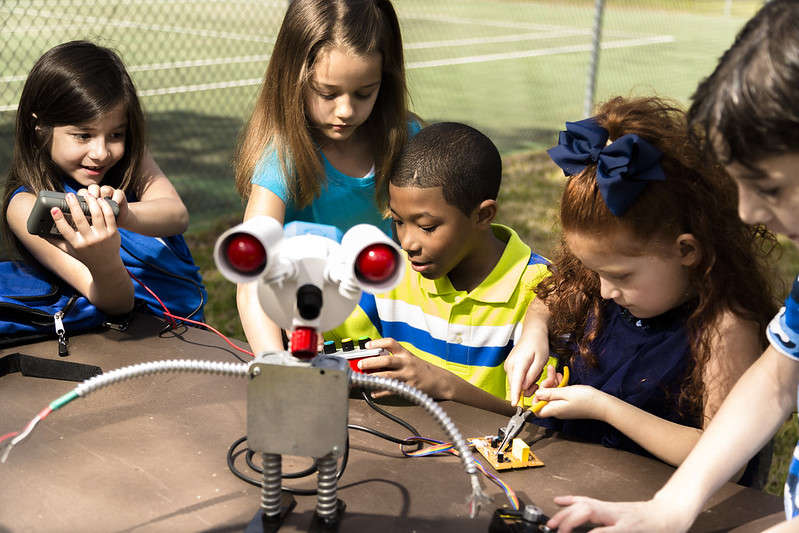 Summer learning loss, the idea that during the summer, students forget months of what they learn during the school year, with low-income students falling even further behind--has for many years been a driving force behind the implementation of comprehensive summer learning programs that blend academic and enrichment learning experiences.
Summer learning loss, the idea that during the summer, students forget months of what they learn during the school year, with low-income students falling even further behind--has for many years been a driving force behind the implementation of comprehensive summer learning programs that blend academic and enrichment learning experiences.
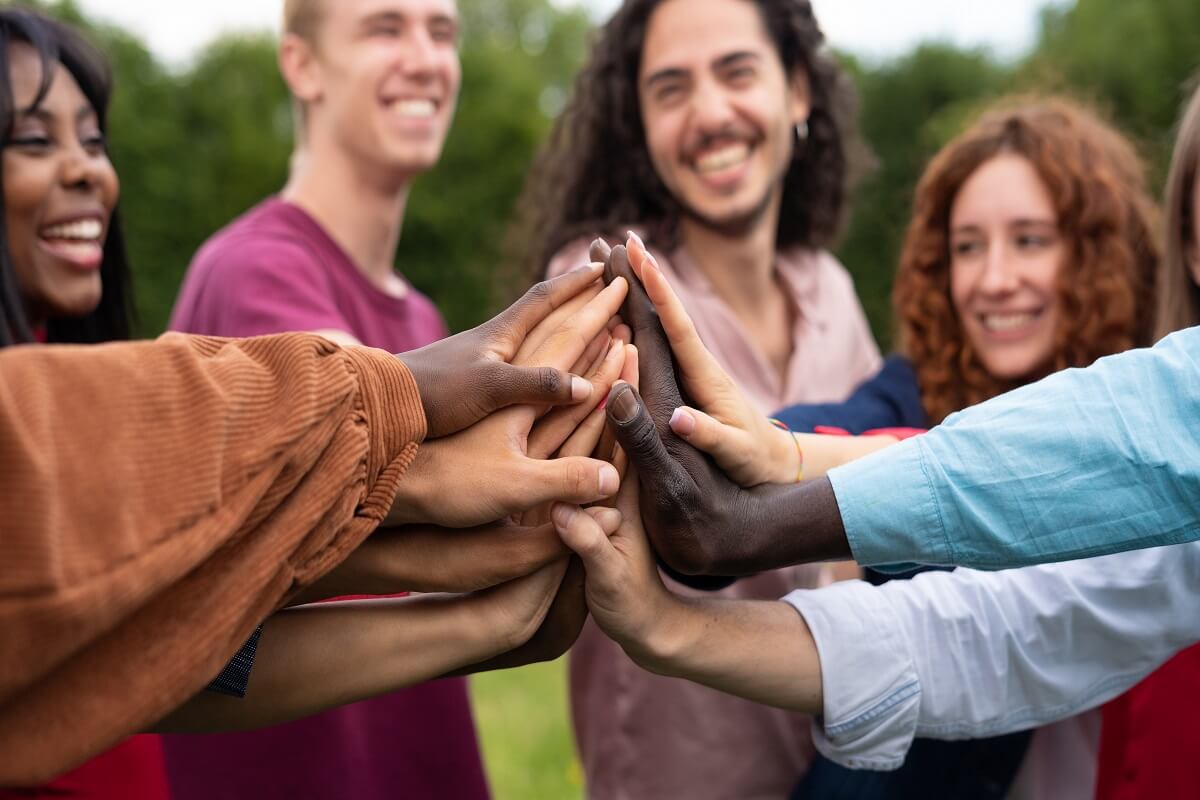
Excerpt from the book The Heartbeat of the Youth Development Field: Professional Journeys of Growth, Connection, and Transformation regarding Relational Cultural Theory.
 Educators, out-of-school time professionals, teachers, and parents have dramatically adjusted their work during the pandemic, and part of this may mean letting go of some things. Yet NIOST Director Georgia Hall says "If we can hold onto one thing, let it be reading."
Educators, out-of-school time professionals, teachers, and parents have dramatically adjusted their work during the pandemic, and part of this may mean letting go of some things. Yet NIOST Director Georgia Hall says "If we can hold onto one thing, let it be reading."
For Immediate Release: December 14, 2017
 This coming weekend is March Madness, the collegiate basketball championships, a good time to consider the social, policy, and bureaucratic issues that affect women in NCAA basketball. Watch researchers from NIOST and colleagues from the Wellesley Centers for Women (WCW) and Wellesley College, discuss wins, losses, and fouls in a recent lunchtime seminar.
This coming weekend is March Madness, the collegiate basketball championships, a good time to consider the social, policy, and bureaucratic issues that affect women in NCAA basketball. Watch researchers from NIOST and colleagues from the Wellesley Centers for Women (WCW) and Wellesley College, discuss wins, losses, and fouls in a recent lunchtime seminar.
Massachusetts 21st Century Community Learning Centers
Ongoing since 2001
Principal Investigator and Project Director: Georgia Hall, Ph.D.
Funder: Massachusetts Department of Elementary and Secondary Education (MADESE)
NIOST began a partnership with the Massachusetts Department of Elementary and Secondary Education (MADESE) in 2001 to develop assessment tools and a menu of technical assistance activities to support the MA 21st CCLC programs. The result of a two-year effort was the creation of the Survey of Academic and Youth Outcomes for Staff and Teachers (SAYO-S&T). These are brief pre/post outcome instruments that allow programs to systematically collect valid and reliable data about youth from afterschool program staff and classroom teachers in nine outcome areas. (Pre/Post means the surveys are taken near the beginning of the program and near the end of the program.) The SAYO was the first of three tools of “A Program Assessment System” (APAS), which now includes a youth survey (SAYO-Y) and a quality assessment tool (APT).
With the development of the SAYO tool, NIOST began a long-standing partnership with MADESE to build its assessment capacity as an agency, and also to build the capacity of their statewide 21st CCLC grantees to understand program evaluation and assessment tools, to learn how to administer surveys and conduct program quality assessments appropriately, to learn techniques for analyzing, interpreting and using quality and outcome data, and to work with staff to engage in continuous quality improvement. Over the years, NIOST has developed and delivered many statewide training workshops, web-based training, and extensive training materials and guides. NIOST continues to be the technical assistance provider to MADESE to support 21st CCLC programs in over 40 school districts and related programs in continuous quality improvement and documentation of youth outcomes.
Massachusetts Afterschool Research Study (MARS)
Completed in 2005
Project Director: Joyce Shortt
The Massachusetts Afterschool Research Study (MARS) is a statewide study examining the links between afterschool program quality and student outcomes, and the efficacy of various models of afterschool for youth. United Way of Massachusetts Bay is collaborating with the Massachusetts Department of Education and the Massachusetts Office of Child Care Services to manage the study, which will be conducted by the National Institute on Out-of-School Time (NIOST) at the Wellesley Centers for Women, Wellesley College, in partnership with the Intercultural Center for Research in Education (INCRE).
MARS aims to create consensus around the elements of program quality, features, and participation that contribute to positive outcomes for youth, so that funders, providers, advocates, and policy-makers are better prepared to expand the quality and availability of afterschool programs. Public and private funders will have the information they need to focus resources on effective program elements; providers will be able to make ongoing quality improvements; and policy-makers will have a reliable foundation on which to base their commitment to afterschool.
Met Life Discovering Community Initiative: An Evaluation Project
Completed in 2006
Project Directors: NIOST, Georgia Hall, Ph.D.
NIOST served as the evaluator for the Discovering Community Initiative, a project of The After School Corporation (TASC). The Met Life Foundation awarded TASC a grant to administer a national project that fosters more positive attitudes and stronger affiliations among teachers, students, and parents within school communities.
The goal of the initiative was to give middle school students, their teachers, and families the resources to strengthen and celebrate their communities and help teachers better understand and appreciate the students and parents that comprise the community in which they teach.
The initiative was carried out through school based afterschool programs in six areas: Baltimore, MD, Boston, MA, Rhode Island, Queens, NY, Utica, NY, and Pinellas County, FL. NIOST managed and oversaw the research and evaluation component, including the creation and dissemination of issue briefs, activity tipsheets, etc., that were shared with a broad spectrum of afterschool program leaders.
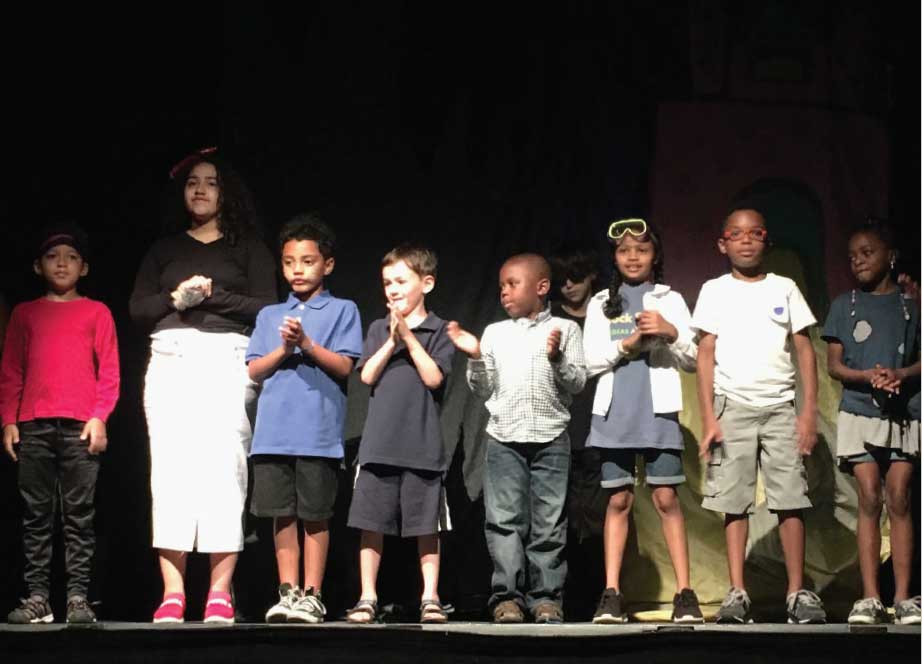 By NIOST DIrector and Senior Scientist Georgia Hall. As if quarantine, loss of parent jobs, food insecurity, and transition to homeschooling weren’t enough of a burden for our children, the ugly, persistent specter of racism raised itself again into widespread consciousness over the last week in multiple and heart-wrenching ways. And even birdwatching became a focal point, after a White woman falsely accused Christian Cooper, a Black man, of threatening her in Central Park while he was birdwatching, and his sister Melody Cooper posted the video to Twitter.
By NIOST DIrector and Senior Scientist Georgia Hall. As if quarantine, loss of parent jobs, food insecurity, and transition to homeschooling weren’t enough of a burden for our children, the ugly, persistent specter of racism raised itself again into widespread consciousness over the last week in multiple and heart-wrenching ways. And even birdwatching became a focal point, after a White woman falsely accused Christian Cooper, a Black man, of threatening her in Central Park while he was birdwatching, and his sister Melody Cooper posted the video to Twitter.
Out-of-school time, education, and youth development professionals are invited to apply for the National Afterschool Matters (NASM) Fellowship, a two-year leadership development program.
 Wellesley College, home of the National Institute on Out-of-School Time, has a significant connection to Marjory Stoneman Douglas High School, site of the Parkland, Florida, school shooting.
Wellesley College, home of the National Institute on Out-of-School Time, has a significant connection to Marjory Stoneman Douglas High School, site of the Parkland, Florida, school shooting.
New York City Urban Debate League: Investigating Youth's Experiences in a "Democracy in Action" Afterschool Program
Completed in 2006
This research project investigated the approach and activities of the New York City Urban Debate League (NYCUDL) and commented on how youth, through participation in these leagues, develop democracy skills and experiences that can affect personal change. Urban debate leagues organized interscholastic debate as an academic competition and promote debate as a valuable learning tool. This research study:
-
described the components of the debate program
-
profiled the youth and adult participants
-
provided an analysis of the “debate” approach and activities as an example of "democracy in action"
-
presented an exploration of the experiences of and impacts on participating youth
- investigated the infrastructure that supports the delivery of urban debate activities
There is a good amount of literature describing the elements of debate and how skills developed in debate may transfer to other endeavors — such as creating a stronger foundation for academic achievement, etc. The purpose of this study was to look deeper into how youth actually experience the democratic ideals and skills that form the foundation of a debate program, and in what ways those experiences influence the youth's understanding of, participation in, and consideration of democracy.
 The National Institute on Out-of-School Time applauds Congress' passage last week of funding for 21st Century Community Learning Centers (21st CCLC) and other out-of-school-time (OST) programs for fiscal year 2018.
The National Institute on Out-of-School Time applauds Congress' passage last week of funding for 21st Century Community Learning Centers (21st CCLC) and other out-of-school-time (OST) programs for fiscal year 2018.
The BOKS before school program, which is currently the subject of a two year evaluation by NIOST researchers, was recently mentioned by First Lady Michelle Obama in her remarks at the launch of the Let's Move Active Schools initiative.
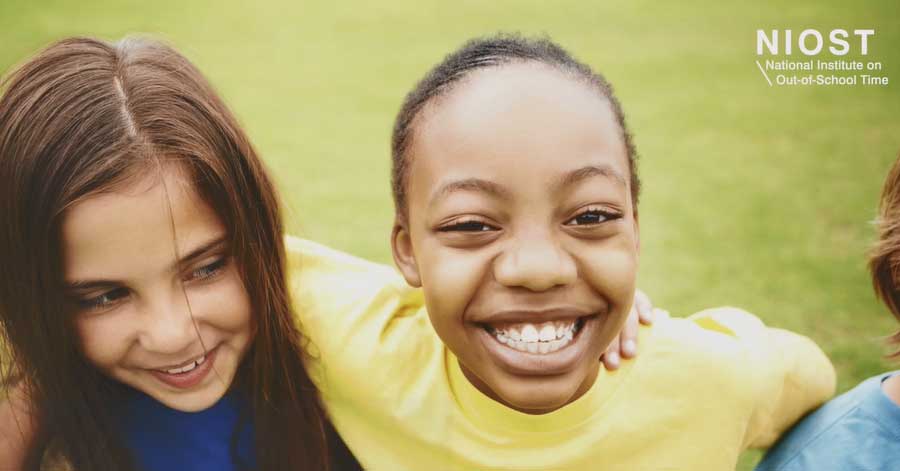 During Afterschool Professionals Appreciation Week, the National Institute on Out-of-School Time (NIOST) celebrates the professionals who enhance our youths' healthy development in out-of-school time programs. Learn why in this new video.
During Afterschool Professionals Appreciation Week, the National Institute on Out-of-School Time (NIOST) celebrates the professionals who enhance our youths' healthy development in out-of-school time programs. Learn why in this new video.
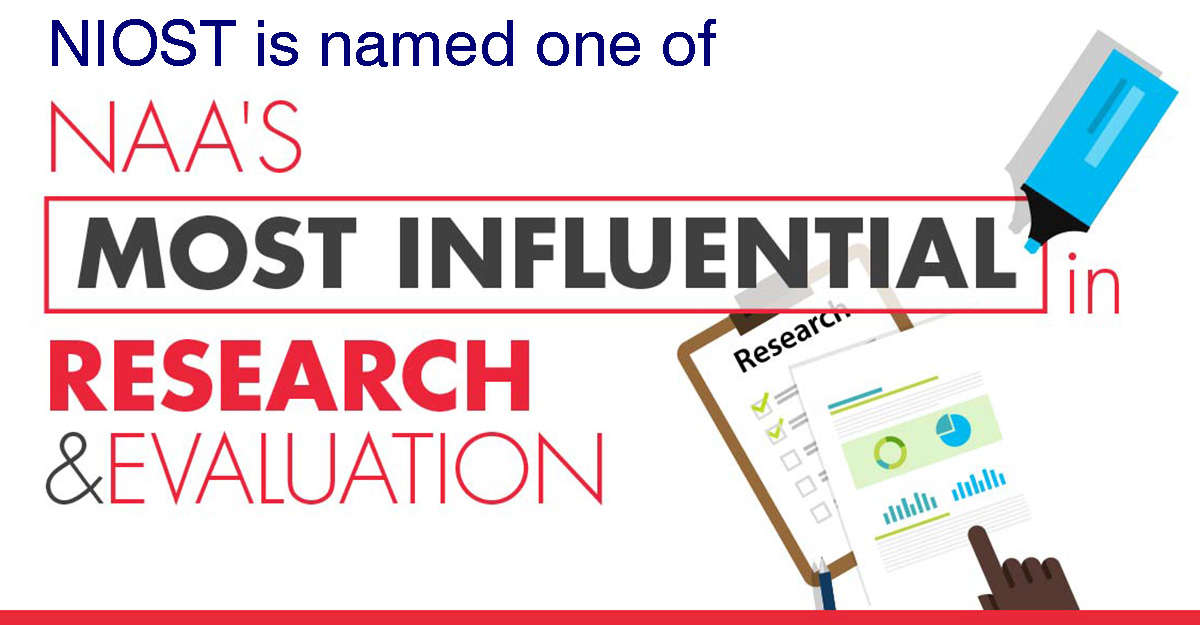 The National AfterSchool Association (NAA), the lead organization for the advancement of the afterschool professional, has selected the National Institute on Out-of-School Time (NIOST) as one of NAA’s 2018 Most Influential in Research and Evaluation. Honorees are distinguished for their contributions to research and evaluation on youth and adolescent development.
The National AfterSchool Association (NAA), the lead organization for the advancement of the afterschool professional, has selected the National Institute on Out-of-School Time (NIOST) as one of NAA’s 2018 Most Influential in Research and Evaluation. Honorees are distinguished for their contributions to research and evaluation on youth and adolescent development.
“NIOST has been a leader in defining, shaping, and promoting out-of-school time as a distinct professional field with evidence-based quality standards for 39 years,” said Georgia Hall, director of NIOST. “We have had the pleasure of not only conducting large and investigator-initiated research, we’ve partnered with on-the-ground program staff to help them measure quality outcomes for all, assess the effectiveness of policies and practices, benchmark against best practices, and develop in-house evaluation skills. We’re proud of this work and the recognition by the National AfterSchool Association.”
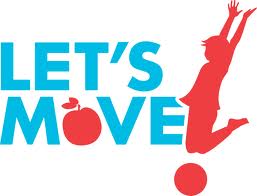 Georgia Hall, Ed.D., senior research scientist at the National Institute on Out-of-School Time (NIOST) at the Wellesley Centers for Women, met with the White House Let's Move! staff in mid-August. Along with representatives of several other national organizations, Hall discussed the valuable role of NIOST.
Georgia Hall, Ed.D., senior research scientist at the National Institute on Out-of-School Time (NIOST) at the Wellesley Centers for Women, met with the White House Let's Move! staff in mid-August. Along with representatives of several other national organizations, Hall discussed the valuable role of NIOST.
Obesity and Chronic Disease Risk Reduction in Out-of-School Time
Ongoing since 2014
Project Director: Georgia Hall, Ph.D.
Funder: Robert Wood Johnson Foundation with RT1, International
This project is a targeted effort to increase peer-reviewed literature in the field of Out of-School Time (OSD physical activity and healthy eating. In partnership with PEAR (Program in Education, Afterschool, & Resiliency) and the National AfterSchool Association, Georgia Hall, Ph.D., of the National Institute on Out-of-School Time (NIOSD at Wellesley Centers for Women and Jean Wiecha, Ph.D. of RTI are editing a special issue of New Directions /or Youth Development (NDYD), which will feature manuscripts regarding the impact of obesity and chronic disease risk reduction interventions that take place in OST program settings. Its purpose is to synthesize evidence to date and to inform future research and policy activities.
Online Learning Pilot Program Evaluation in Wyoming
Ongoing since 2013
Project Directors: Georgia Hall, Ph.D.
Funded by: Wyoming Community Foundation on behalf of the Wyoming Afterschool Alliance
NIOST will evaluate a new online learning program
The National Institute on Out-of-School Time (NIOST) will use electronic surveys and individual interviews along with reviewing electronic learning modules to evaluate a new online learning program.
Out of Harm's Way
Completed in 2009
Project Director: Georgia Hall, Ph.D.
The Primary goal of the Out of Harm's Way (OHW) Initiative is to address the escalating violence in a subset of middle schools in the Boston Public Schools by offering comprehensive services and care, and increasing the participation of students in after school programming. Wellesley Centers for Women and the National Institute on Out-of-School Time would perform as the project evaluator.
Spring 2018 Afterschool Matters Journal Now Available: April 24, 2018
Physical Activity Study in the Natick Public Schools: Focus on BOKS
Ongoing since 2009
Project Directors: Georgia Hall, Ph.D.
Funder: Reebok International LTD
This project will focus on the BOKS program, which aims to improve kids' academic performance and overall health using physical activity to jump start children's brains in the morning.
Georgia Hall, Ph.D. will direct a multi-year Physical Activity Study in the Natick Public Schools (Natick, MA) with a special investigation of the BOKS (formerly known as Fit Kidz Get Up & Go) before school physical activity program. The BOKS program aims to improve kids’ academic performance and overall health using physical activity to jump start children’s brains in the morning and better equip them for learning, increasing opportunities for kids to be physically active and fit, and creating healthier habits for children to achieve life-long fitness. Focusing on grades K-2, a team of NIOST researchers will examine and document child-level academic, social, nutrition knowledge, and physical outcomes associated with participation in BOKS over time.
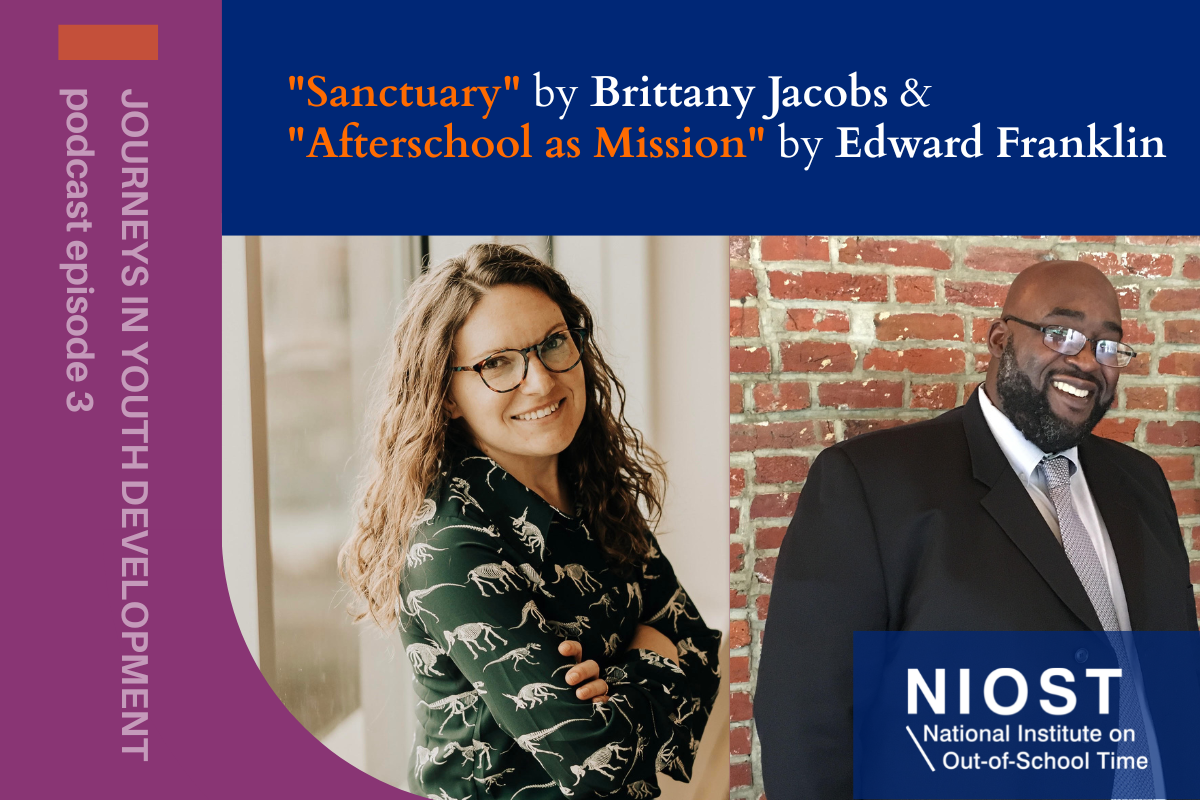
NIOST director Georgia Hall, Ph.D., talks with Brittany Jacobs, Library Director at the Burlington Public Library in Iowa and Edward Franklin, President and CEO of Voice of Hope Ministries in Texas.
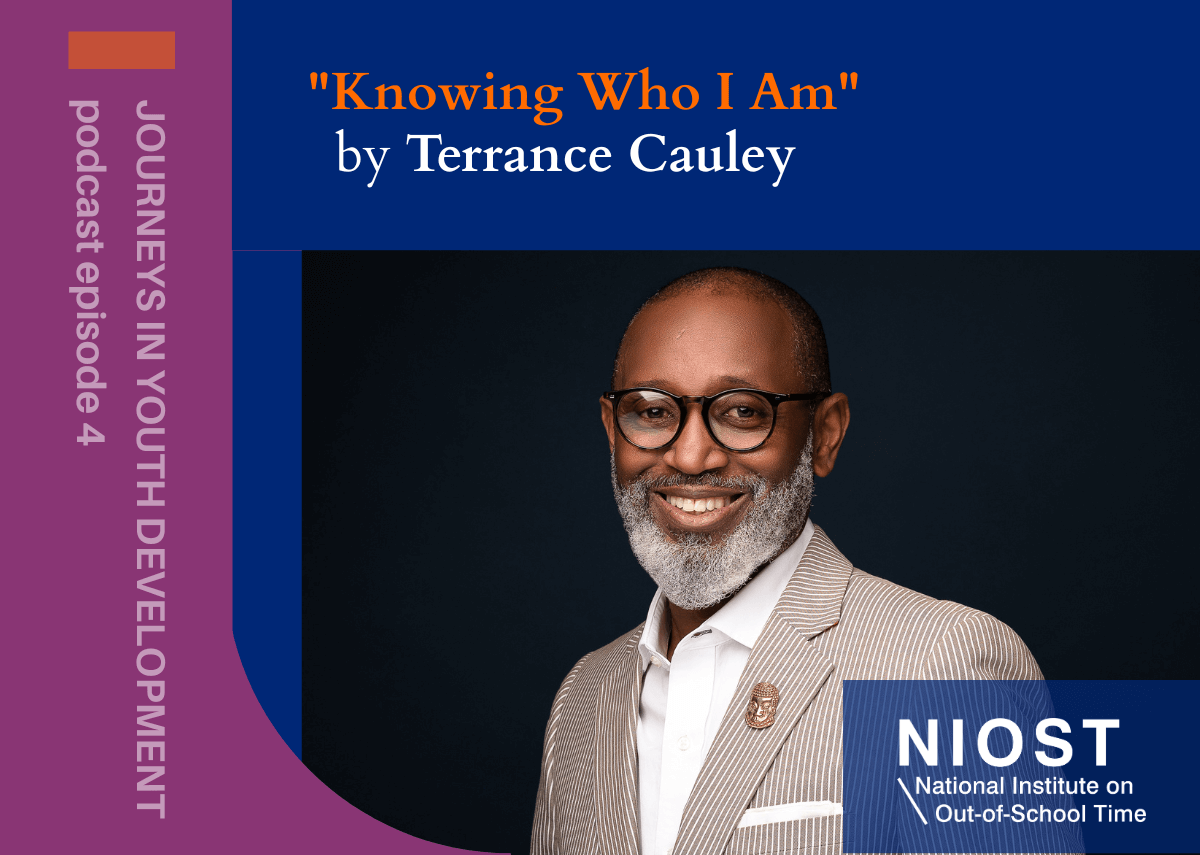 NIOST director Georgia Hall, Ph.D., talks to Terrance Cauley, Senior Director in the Department of Youth, Family & Clinical Services at Better Family Life, Inc. in St. Louis, Missouri.
NIOST director Georgia Hall, Ph.D., talks to Terrance Cauley, Senior Director in the Department of Youth, Family & Clinical Services at Better Family Life, Inc. in St. Louis, Missouri.
Program Practices: An Investigation of
Physical Activity and Healthy Eating Standards
and Practices in Out-of-School Time Programs
Completed in 2011
Principal Investigator: Georgia Hall, Ph.D.
Co-Principal Investigator: Jean Wiecha, Ph.D.
Team Members: Georgia Hall, Ph.D., Jean Wiecha, Ph.D. (University of Massachusetts), Ellen Gannett, M.Ed., Barbara Roth (YMCA of the USA), Julie Dennehy, M.M., Diane Gruber, M.A.
Background
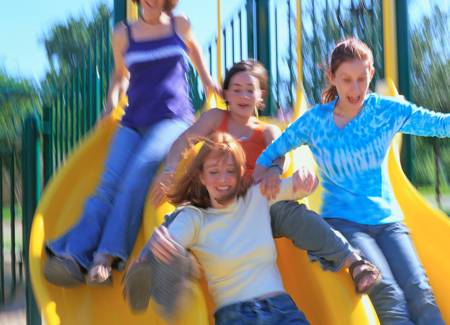 Energy balance and appropriate physical activity are critical to preventing obesity and associated cardiometabolic morbidity. In the United States, 6.5 million children attend out-of-school time programs annually, participating in roughly 3 hours per day of activities typically including homework, snack, and gross motor play. If out-of-school time programs can provide appropriate snack and physical activity choices, they can be an important component of the campaign against childhood obesity. There is a window of opportunity to infuse more rigorous content and provide guidance and language in the National Afterschool Association standards for physical activity and healthy eating.
Energy balance and appropriate physical activity are critical to preventing obesity and associated cardiometabolic morbidity. In the United States, 6.5 million children attend out-of-school time programs annually, participating in roughly 3 hours per day of activities typically including homework, snack, and gross motor play. If out-of-school time programs can provide appropriate snack and physical activity choices, they can be an important component of the campaign against childhood obesity. There is a window of opportunity to infuse more rigorous content and provide guidance and language in the National Afterschool Association standards for physical activity and healthy eating.
Specific Aims
- To build capacity for childhood obesity prevention in OST by infusing rigorous science-based standards and guidelines into NAA standards for physical activity and healthy eating
- Identify current physical activity and healthy eating standards used in a targeted national sample of OST programs
- Identify current program practices in these areas
- Identify statistically significant associations between best practices and program characteristics, components, and social contextual variables
- Disseminate information on effective implementation of high quality standards, through a comprehensive report, study briefs, and presentations at national conferences.
- Lay the groundwork for a subsequent Phase 2 project to re-assess the program cohort and develop a tool kit to help all OST programs implement the rigorous science-based standards for physical activity and healthy eating.
Methods
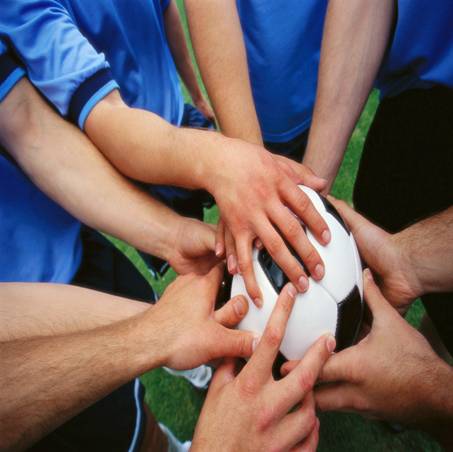 This is a mixed-methods research study using a sequence of quantitative and qualitative data collection methods and multiple regression modeling to examine program characteristics associated with providing healthy eating and physical activity opportunities in a national sample of out-of-school time programs. Effective practice will be operationalized through the application of a field-tested research-based survey reflecting current standards and guidelines established through expert sources such as the Center for Disease Control and Prevention and the National Academy of Science - Institute of Medicine. Data will be collected in ten regions representing a mix of geographic locations, urban/suburban/rural communities, school district sizes, and variety of out-of-school time programs. The sampling frame will be comprised of programs with diverse demographic school district profiles and large percentage of students eligible for free/reduced lunch. The survey sample will include 80-100 programs within each region (500+ total) and Exemplary Program Observations at 30 of these programs.
This is a mixed-methods research study using a sequence of quantitative and qualitative data collection methods and multiple regression modeling to examine program characteristics associated with providing healthy eating and physical activity opportunities in a national sample of out-of-school time programs. Effective practice will be operationalized through the application of a field-tested research-based survey reflecting current standards and guidelines established through expert sources such as the Center for Disease Control and Prevention and the National Academy of Science - Institute of Medicine. Data will be collected in ten regions representing a mix of geographic locations, urban/suburban/rural communities, school district sizes, and variety of out-of-school time programs. The sampling frame will be comprised of programs with diverse demographic school district profiles and large percentage of students eligible for free/reduced lunch. The survey sample will include 80-100 programs within each region (500+ total) and Exemplary Program Observations at 30 of these programs.
Healthy Out-of-School Time: Related Resources (HOST)
Healthy Out-of-School Time:
Related Resources (HOST)
Research and Evaluation Study with BridgeUP: STEM
Ongoing since 2015
Principal Investigator and Project Director: Georgia Hall, Ph.D.
Funded by: American Museum of Natural History
The National Institute on Out-of-School Time is serving as the research and evaluation study partner to BridgeUP: STEM an initiative of the American Museum of Natural History (AMNH) in Manhattan, New York. BridgeUP: STEM is a portfolio of educational and public programs focused on teaching computer science through the lens of science. Funded by a generous 5-year, $7.5M gift from the Helen Gurley Brown Trust, these programs are focused on changing the ratio of women and minorities in STEM.
In January 2015, BridgeUP: STEM launched the Brown Scholars Program, an intensive experience for cohorts of 9th and 10th grade girls, that uses science and scientific data sets to instill fluency in computer science and technology through the context of life sciences. Cohorts of New York City high school girls, known as Brown Scholars, are selected based on competitive application to the program. The BridgeUP: STEM program coursework was designed to introduce participants to the basics of computational science, and, in particular, how data is used, analyzed, and visualized in the natural sciences. The BridgeUP: STEM program content for both cohorts included coursework in Python programming language, group projects, mentorship, field trips, and presentations by Museum curators and researchers. In addition there is a Middle School one-week intensive program.
Since the BridgeUP: STEM program commenced NIOST has been investigating impact at the participant level for both high school and middle school. We are examining change in attitude and interest about STEM/CS/Technology, engagement in STEM/CS/Technology pathways, expansion of content knowledge, interest in STEM/CS/Technology career connections, and aspirations. The research team expects the information collected, shared, and translated from this study and consultation to be informative to BridgeUP: STEM and enhance the quality of the initiative’s experiences for participating youth, families, and Museum staff.
NIOST is the research and evaluation study partner to BridgeUP: STEM, an initiative of the American Museum of Natural History (AMNH) in New York. BridgeUP: STEM is a portfolio of educational and public programs focused on teaching computer science through the lens of science. Funded by a gift from the Helen Gurley Brown Trust, these programs are focused on increasing the ratio of women and minorities in STEM fields.
BridgeUP: STEM launched the Brown Scholars Program, an intensive experience for cohorts of 9th and 10th grade girls that uses science and scientific data sets to instill fluency in computer science and technology through the context of life sciences. Cohorts of New York City high school girls are selected through a competitive application to the program. The BridgeUP: STEM program coursework was designed to introduce participants to the basics of computational science, and, in particular, how data is used, analyzed, and visualized in the natural sciences. The program content included coursework in Python programming language, group projects, mentorship, field trips, and presentations by Museum curators and researchers. In addition there is a middle school one-week intensive program.
NIOST has been investigating impact at the participant level for both high school and middle school since the program commenced. We are examining change in attitude and interest about STEM/CS/Technology, engagement in STEM/CS/Technology pathways, expansion of content knowledge, interest in STEM/CS/Technology career connections, and related aspirations. The information collected, shared, and translated from this study and consultation will be informative to AMNH and the BridgeUP: STEM program, and will enhance the quality of the experiences for participating youth, their families, and Museum staff.
 NIOST research scientists and trainers will be presenting at next week's National AfterSchool Association Convention in Atlanta, Georgia. Come and see us!
NIOST research scientists and trainers will be presenting at next week's National AfterSchool Association Convention in Atlanta, Georgia. Come and see us!

 State primary elections are wrapping up and election season isn't far behind. Regardless of political beliefs, out-of-school-time programs are helping the next generation of voters become informed and engaged citizens, as research from Afterschool Matters has shown.
State primary elections are wrapping up and election season isn't far behind. Regardless of political beliefs, out-of-school-time programs are helping the next generation of voters become informed and engaged citizens, as research from Afterschool Matters has shown. Summer learning loss, the idea that during the summer, students forget months of what they learn during the school year, with low-income students falling even further behind--has for many years been a driving force behind the implementation of comprehensive summer learning programs that blend academic and enrichment learning experiences.
Summer learning loss, the idea that during the summer, students forget months of what they learn during the school year, with low-income students falling even further behind--has for many years been a driving force behind the implementation of comprehensive summer learning programs that blend academic and enrichment learning experiences.
 Educators, out-of-school time professionals, teachers, and parents have dramatically adjusted their work during the pandemic, and part of this may mean letting go of some things. Yet NIOST Director Georgia Hall says "If we can hold onto one thing, let it be reading."
Educators, out-of-school time professionals, teachers, and parents have dramatically adjusted their work during the pandemic, and part of this may mean letting go of some things. Yet NIOST Director Georgia Hall says "If we can hold onto one thing, let it be reading." This coming weekend is March Madness, the collegiate basketball championships, a good time to consider the social, policy, and bureaucratic issues that affect women in NCAA basketball. Watch researchers from NIOST and colleagues from the Wellesley Centers for Women (WCW) and Wellesley College, discuss wins, losses, and fouls in a recent lunchtime seminar.
This coming weekend is March Madness, the collegiate basketball championships, a good time to consider the social, policy, and bureaucratic issues that affect women in NCAA basketball. Watch researchers from NIOST and colleagues from the Wellesley Centers for Women (WCW) and Wellesley College, discuss wins, losses, and fouls in a recent lunchtime seminar. By NIOST DIrector and Senior Scientist Georgia Hall. As if quarantine, loss of parent jobs, food insecurity, and transition to homeschooling weren’t enough of a burden for our children, the ugly, persistent specter of racism raised itself again into widespread consciousness over the last week in multiple and heart-wrenching ways. And even birdwatching became a focal point, after a White woman falsely accused Christian Cooper, a Black man, of threatening her in Central Park while he was birdwatching, and his sister Melody Cooper
By NIOST DIrector and Senior Scientist Georgia Hall. As if quarantine, loss of parent jobs, food insecurity, and transition to homeschooling weren’t enough of a burden for our children, the ugly, persistent specter of racism raised itself again into widespread consciousness over the last week in multiple and heart-wrenching ways. And even birdwatching became a focal point, after a White woman falsely accused Christian Cooper, a Black man, of threatening her in Central Park while he was birdwatching, and his sister Melody Cooper  Wellesley College, home of the National Institute on Out-of-School Time, has a significant connection to Marjory Stoneman Douglas High School, site of the Parkland, Florida, school shooting.
Wellesley College, home of the National Institute on Out-of-School Time, has a significant connection to Marjory Stoneman Douglas High School, site of the Parkland, Florida, school shooting. During Afterschool Professionals Appreciation Week, the National Institute on Out-of-School Time (NIOST) celebrates the professionals who enhance our youths' healthy development in out-of-school time programs. Learn why in this new video.
During Afterschool Professionals Appreciation Week, the National Institute on Out-of-School Time (NIOST) celebrates the professionals who enhance our youths' healthy development in out-of-school time programs. Learn why in this new video. The National AfterSchool Association (
The National AfterSchool Association ( Georgia Hall
Georgia Hall
 NIOST director Georgia Hall, Ph.D., talks to Terrance Cauley, Senior Director in the Department of Youth, Family & Clinical Services at Better Family Life, Inc. in St. Louis, Missouri.
NIOST director Georgia Hall, Ph.D., talks to Terrance Cauley, Senior Director in the Department of Youth, Family & Clinical Services at Better Family Life, Inc. in St. Louis, Missouri. Energy balance and appropriate physical activity are critical to preventing obesity and associated cardiometabolic morbidity. In the United States, 6.5 million children attend out-of-school time programs annually, participating in roughly 3 hours per day of activities typically including homework, snack, and gross motor play. If out-of-school time programs can provide appropriate snack and physical activity choices, they can be an important component of the campaign against childhood obesity. There is a window of opportunity to infuse more rigorous content and provide guidance and language in the National Afterschool Association standards for physical activity and healthy eating.
Energy balance and appropriate physical activity are critical to preventing obesity and associated cardiometabolic morbidity. In the United States, 6.5 million children attend out-of-school time programs annually, participating in roughly 3 hours per day of activities typically including homework, snack, and gross motor play. If out-of-school time programs can provide appropriate snack and physical activity choices, they can be an important component of the campaign against childhood obesity. There is a window of opportunity to infuse more rigorous content and provide guidance and language in the National Afterschool Association standards for physical activity and healthy eating. This is a mixed-methods research study using a sequence of quantitative and qualitative data collection methods and multiple regression modeling to examine program characteristics associated with providing healthy eating and physical activity opportunities in a national sample of out-of-school time programs. Effective practice will be operationalized through the application of a field-tested research-based survey reflecting current standards and guidelines established through expert sources such as the Center for Disease Control and Prevention and the National Academy of Science - Institute of Medicine. Data will be collected in ten regions representing a mix of geographic locations, urban/suburban/rural communities, school district sizes, and variety of out-of-school time programs. The sampling frame will be comprised of programs with diverse demographic school district profiles and large percentage of students eligible for free/reduced lunch. The survey sample will include 80-100 programs within each region (500+ total) and Exemplary Program Observations at 30 of these programs.
This is a mixed-methods research study using a sequence of quantitative and qualitative data collection methods and multiple regression modeling to examine program characteristics associated with providing healthy eating and physical activity opportunities in a national sample of out-of-school time programs. Effective practice will be operationalized through the application of a field-tested research-based survey reflecting current standards and guidelines established through expert sources such as the Center for Disease Control and Prevention and the National Academy of Science - Institute of Medicine. Data will be collected in ten regions representing a mix of geographic locations, urban/suburban/rural communities, school district sizes, and variety of out-of-school time programs. The sampling frame will be comprised of programs with diverse demographic school district profiles and large percentage of students eligible for free/reduced lunch. The survey sample will include 80-100 programs within each region (500+ total) and Exemplary Program Observations at 30 of these programs.  NIOST research scientists and trainers will be presenting at next week's
NIOST research scientists and trainers will be presenting at next week's 

